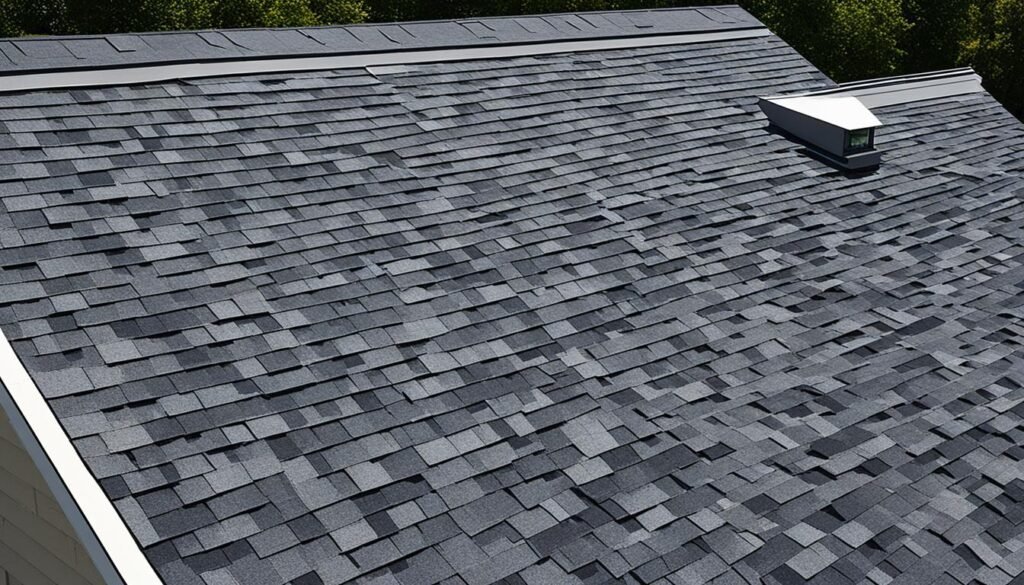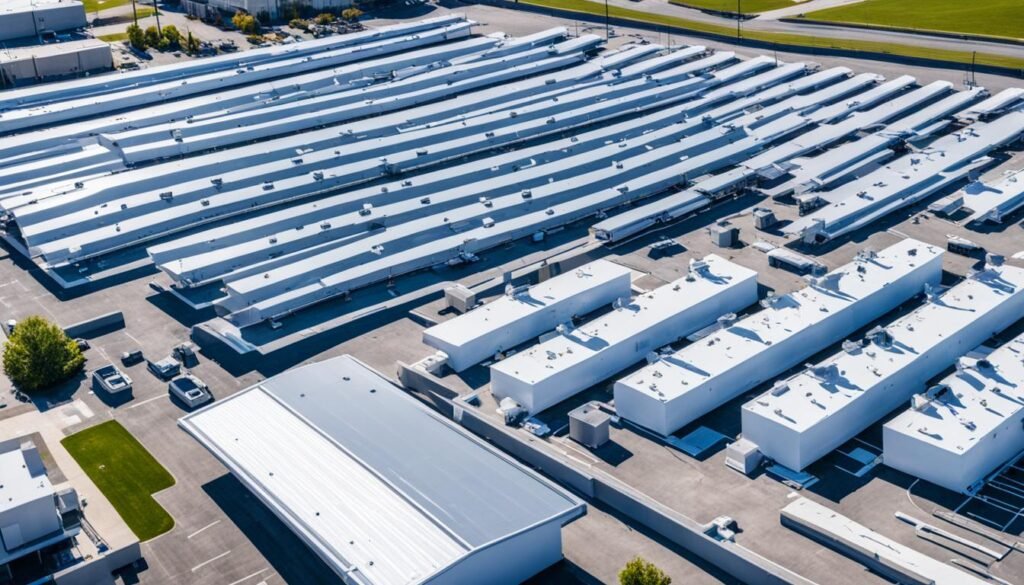Did you know that commercial roofs are some of the most challenging and complex structures to construct?
Intricate roof designs, demanding installations, and the need for efficient drainage systems make commercial roofs one of the toughest roofing types to tackle.
Key Takeaways
- Commercial roofs are designed to be flat for several reasons, including ease of installation on large buildings.
- Flat roofs provide space for HVAC units, saving interior space and reducing noise.
- They are cost-effective, offer energy-saving options, and can accommodate greenery and organic materials.
- Flat roofs do not require gutters, are easier to access and maintain, and are durable and long-lasting.
- Consulting with professionals is essential when deciding on the roofing system for a commercial building.
Advantages of Pitched Roofs for Residential Structures
Residential structures often utilize pitched roofs, which offer numerous benefits for homeowners. One notable advantage is the provision of attic space, providing valuable storage room for your belongings. This additional space allows you to declutter your living area and safely store items that you don’t need immediate access to.
Another significant benefit of pitched roofs is their steeper slope, which enables effective water drainage. The angle of the roof ensures that rainwater and other forms of precipitation flow off the roof quickly, reducing the risk of water-related issues such as leaks and structural damage. With proper installation and adequate maintenance, pitched roofs offer superior protection against water infiltration compared to other roof types.
Furthermore, pitched roofs generally require less overall maintenance compared to flat roofs. The steeper slopes make it challenging for debris to accumulate, reducing the likelihood of clogs and the need for regular cleaning. However, it is important to note that due to the difficulty of accessing steep slopes, professional cleaning may be required periodically.
Increased Attic Space
With a pitched roof, you can unlock the untapped potential of attic space in your home. From storing seasonal items to creating a cozy, private retreat, your attic can serve a variety of purposes.”
– John Smith, Homeowner
Effective Water Drainage
The steep slope of a pitched roof ensures that rainwater flows away from the roof quickly, preventing water damage and maintaining the integrity of the structure.
– Sarah Johnson, Roofing Expert

Overall, pitched roofs offer homeowners the advantages of increased attic space for storage and effective water drainage, providing both practical and functional benefits. While regular maintenance is still necessary, pitched roofs are a popular choice for residential structures due to their durability, longevity, and aesthetic appeal.
Flat Roofs for Commercial Buildings
When it comes to commercial buildings, flat roofs are the ideal choice due to their cost-effectiveness and practicality. Unlike residential structures where pitched roofs are more commonly used, installing pitched roofs on large commercial buildings would be impractical, dangerous, and difficult.
One of the main advantages of flat roofs in commercial settings is the ample space they provide for storing and servicing HVAC units. By utilizing the roof as a designated area for these units, interior space is saved, allowing for more efficient use of the building and optimizing parking areas.
In addition, commercial buildings often incorporate efficient drainage systems known as water abatement structures. These systems eliminate the need for gutters, further streamlining the design and reducing maintenance requirements. By incorporating proper drainage, flat roofs ensure that water flows away from the building, mitigating the risk of water damage.
Furthermore, flat roofs offer easy accessibility, making regular maintenance and inspections more convenient. This accessibility enhances safety for workers who need to access the roof for maintenance purposes, reducing the risk of accidents.
From a financial perspective, flat roofs are a cost-effective roofing solution for commercial projects. Their simplified design and construction result in lower installation costs compared to pitched roofs. Additionally, the durability of flat roofs makes them a wise long-term investment, as they can withstand harsh weather conditions and last for many years with proper maintenance.
Benefits of Flat Roofs for Commercial Buildings:
- Cost-effective roofing solution
- Space-saving design for A/C units
- Efficient drainage systems
- Easy accessibility for regular maintenance
Overall, the affordability, practicality, and durability of flat roofs make them an ideal choice for commercial buildings. Their cost-effectiveness, ability to accommodate HVAC units, efficient drainage systems, and ease of access highlight why flat roofs are the preferred roofing option in commercial construction.

| Advantages of Flat Roofs for Commercial Buildings | Advantages of Pitched Roofs for Residential Structures |
|---|---|
| Cost-effective roofing solution | Traditional and aesthetically pleasing |
| Space-saving for A/C units | Attic space for storage |
| Efficient drainage systems | Effective water drainage |
| Easy accessibility for maintenance | Reduced maintenance requirements |
Conclusion
When it comes to commercial buildings, flat roofs offer numerous benefits and considerations that make them a popular choice. From their ease of installation to the space-saving advantages, flat roofs provide a cost-effective and energy-efficient solution for commercial projects. One of the key advantages of flat roofs is the additional storage space they offer, allowing businesses to utilize the area for various purposes.
Moreover, flat roofs provide the perfect platform for installing cool roofing options and solar panels, contributing to environmental sustainability while reducing energy costs. The efficient drainage systems designed for flat commercial roofs eliminate the need for gutters, streamlining maintenance and reducing potential issues related to water damage.
Another advantage of flat roofs is their compatibility with modern commercial construction materials, making it easier to integrate them into the overall design of the building. Additionally, flat roofs are easily accessible for maintenance purposes, ensuring regular inspections and upkeep to prolong their longevity.
When choosing a roofing system for your commercial building, it is crucial to consult with professionals who can guide you through the specific requirements and considerations of your project. By considering the benefits of flat roofs, such as their space-saving advantages, versatility for alternative energy solutions, and efficient drainage systems, you can make an informed decision that meets the unique needs of your commercial property.
FAQ
What are the advantages of installing a flat roof on a commercial building?
Flat roofs are favored for commercial buildings due to their cost-effectiveness, practicality, and space-saving advantages. They provide room for HVAC units, saving valuable interior space and reducing noise. Flat roofs can be made with white or highly reflective materials to resist sun damage and reduce energy costs. They can also accommodate greenery and organic materials, contributing to environmental sustainability. Flat roofs do not require gutters and are easier to access and maintain compared to pitched roofs.
Why are pitched roofs commonly used in residential structures?
Pitched roofs, commonly found in residential structures, offer several advantages. They provide attic space for storage, which is a valuable asset for homeowners. Pitched roofs also have a steeper slope, enabling effective drainage and reducing the risk of water-related issues. These roofs require less overall maintenance but may necessitate professional cleaning due to the difficulty of accessing steep slopes.
Why are flat roofs preferred for commercial buildings?
Flat roofs are chosen for commercial buildings due to their cost-effectiveness and practicality. Installing pitched roofs on large commercial structures would be impractical, dangerous, and difficult. Flat roofs provide space for storing and servicing HVAC units, saving interior space and optimizing parking areas. Commercial buildings typically use water abatement structures for efficient drainage, eliminating the need for gutters. Flat roofs offer ease of access and are safer to walk on, allowing for regular maintenance. The affordability and durability of flat roofs make them ideal for commercial projects.
What are the primary benefits of flat roofs for commercial buildings?
Flat roofs are commonly chosen for commercial buildings due to their ease of installation, space-saving advantages, cost-effectiveness, and energy efficiency. They offer additional storage space, allow for the installation of cool roofing options and solar panels, and provide efficient drainage systems. Flat roofs are compatible with modern commercial construction materials and are easily accessible for maintenance purposes. While flat roofs require regular upkeep, they can last for many decades when properly maintained. When deciding on the roofing system for a commercial building, it is essential to consult with professionals to determine the best option based on the specific requirements and considerations of the project.